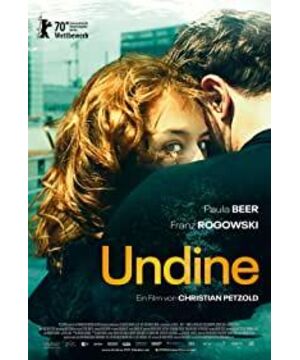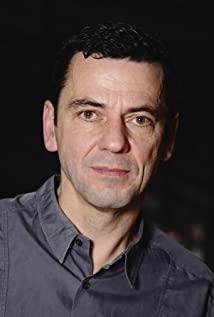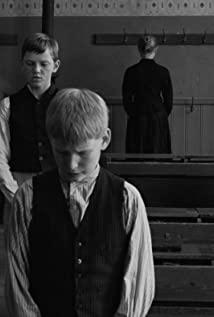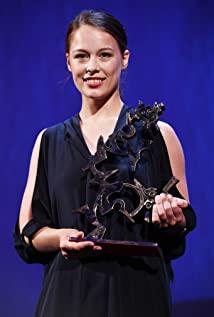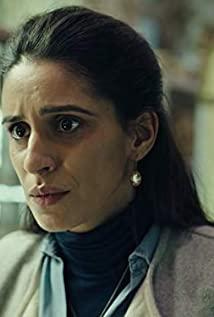Seeing him and his she leave, Wendini slowly sank herself into the indigo lake bottom. At this moment, she is already a love elf.
This is the last shot of "Wendini", a subjective viewpoint shot from "Love's Watching Off". Below the loneliness of blue, and the loneliness of water.
This is the first installment in director Christian Petzold's "Elemental Elf trilogy." The so-called Elemental Spirits are probably based on the enchanting genes of German folk heroic epics such as "Song of the Nibelung", to tell some contemporary German stories, and to indicate that these ancient roots are in the modern appearance of Germany today. Just like the catfish Big Gunther in the film "Undine" and the prototype of Undine from medieval folklore - she is a water spirit, and in her there is an inescapable Open the curse, she will kill the man who betrayed her and will return to the water. Time goes around, in the current Germany of the 2020s, the old elves have been transformed into docents explaining the history of Berlin in the Urban Development Bureau every day, but they are still unable to escape this trailing curse.
Wentini doesn't love Johannes, she just leaves him and will die. "If I come back from work and you're not here, I'll kill you," she gave a solemn warning to the man who was disloyal to her. However, men will only wait for the woman they love, under the spell of dopamine. The empty seats of the open-air cafe proclaim the honesty of a renegade man. The tsunami in my heart is rolling wildly, and the next second is to kill this traitor of love. From this scene, this realist story suddenly veers into a German fantasy that can be seen as a kind of cinematic archetype. Petzold uses distorted distant voices and rapid advances in camera to create this style of fantasy. Cyclonus mutation. An ethereal voice - calling the name "Wendini" softly - came from the aquarium in the cafe, and at the same time a strange man with tenderness and love written on his face entered the cafe, expressing awkwardly. My own affection for Wendini. The aquarium exploded like a flaming bomb, and a flood of water brought new love to wipe out Wendini's killing intent. With a new lover, who cares about the old one.
This is the beginning of the film, and since then the whole story has been running non-stop towards the road that is both true and false, indistinguishable from true and false. For example, the catfish on the bottom of the lake, the phone call from the brain-dead Christopher, the phantom of the missing Wentini seen while diving - a phantom pain after a violent amputation A bone-eating nostalgia for someone who suddenly disappeared from your life. But, for a fairy tale, truth and falsehood are the least of the things. Beneath the Germans' preference for fantasy, we see the essence of a certain kind of love in an incredible story.
Your heart skips a beat when you see the man on the bridge. The extreme of eroticism is a crazy animal sexual behavior. This is reflected in everyone in this Max Orpheus-style love relay story. For the sake of the new girlfriend's phone call, completely disregarding the aftermath of the death threat to the ex-girlfriend, and refreshingly empty the coffee table, this is John Nas who loves the new and hates the old. If I don't get it, I will destroy it. If I don't have love, I will die. That is Wendini, who is extremely possessive. Of course, the most obvious example is Christopher, who has a sensual and loyal dog face. It's okay. We all understand the tightness of love, the stupidity of chasing trains, and every second wanting to be with you. The two girlfriends became one, shouting the name "Wendini" wildly by the lake in the middle of the night. Really live for love, die for love, the brain is captured by libido.
This is a film full of technicalism in its audio-visual language, and Petzold has made various attempts to be gorgeous and concise in order to create the atmosphere of a fairy fable film. From the pros and cons of the negotiation scene at the beginning, to all kinds of pressing pushes, as well as the classic Google Map zoom-in lens that talks about "where are we now" when explaining the urban development of Berlin-exposure Wentini's mind at work was distracted. What strikes me the most is the parallel delayed contrast between the sigh on the lake and the groan on the bed, a kind of poetic philosophy. This is the culmination of the beauty of the whole film in my opinion. Although the film thereafter, especially in the second half, with the appearance of elf themes and murder in the image, tends to be a kind of horror landscape that pays homage to German Expressionism or Herzog: Christopher meets underwater When it comes to Wendini's shot, it's a ghostly horror.
When explaining the history of Berlin's urban development, Wentini said: Berlin, the word means, is a swamp or dry land in a swamp. The underwater big gunter catfish is the history and culture of Germany and all the memory hidden in the city, and it is it that finally recalled Wendine. The film "Wendini" also points to a reference to Berlin's history because of the commentary she repeated through the mouth of Wentini, a historian of the Urban Development Bureau. The ancient elves traveled through time and turned into lecturers in work clothes, reminding people - don't forget yesterday, yesterday's elves are still lurking in every inconspicuous corner of the city.
In the dry land of this swamp, a giant catfish delivered a parting poem it wrote - say goodbye, but never forget me.
View more about Undine reviews


